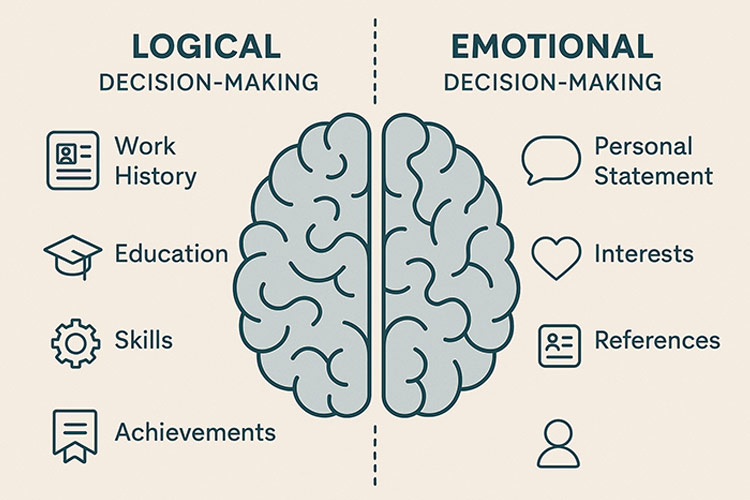The Authority Trigger
We’re psychologically wired to respect authority and expertise. When your CV subtly demonstrates authority in your field, it creates instant credibility that influences everything else the recruiter reads.
This isn’t about boasting – it’s about strategic signals of competence:
- Industry-specific terminology (without jargon overload)
- Recognisable brands, certifications, or projects
- Methodology mentions that show systematic expertise
Instead of: “Responsible for improving processes”
Try: “Implemented Lean Six Sigma methodology, reducing operational waste by 34%”
The specific methodology reference immediately signals expertise and authority.
The Cognitive Ease Effect
When information is easy to process, our brains associate that ease with positive feelings about the content itself. A well-formatted CV with clear, scannable sections doesn’t just look professional – it actually makes the recruiter feel more positive about you as a candidate.
This is why formatting matters more than most people realise:
- Consistent spacing and alignment
- Clear section headers
- Bullet points that follow a logical structure
- Appropriate white space
Your brain interprets ease of processing as truthfulness and competence, even though there’s no logical connection between the two.
The Curiosity Gap Principle
Our brains are wired to want to fill information gaps. When your CV creates strategic curiosity – revealing enough to intrigue but not everything – it makes recruiters want to learn more about you.
Instead of: “Led successful marketing campaign”
Try: “Developed proprietary customer segmentation approach that increased conversion rates by 47%”
The word “proprietary” creates intrigue. The recruiter now wants to understand this approach, making them more likely to invite you for an interview.
The Social Proof Trigger
Humans naturally value what others value. Subtle indicators that you’ve been validated by others create immediate psychological credibility.
This doesn’t mean name-dropping inappropriately, but rather including brief signals that others have recognised your value:
- “Selected from team of 20 to lead client presentation”
- “Promoted ahead of schedule based on performance”
- “Requested to join crisis response team”
These phrases suggest that other people have already validated your abilities.
The Concrete Detail Effect
Specific details are more believable and memorable than general claims. When your brain encounters precise information, it processes it as more credible than vague statements.
Generic: “Significantly improved customer satisfaction”
Specific: “Increased customer satisfaction scores from 72% to 89% within six months”
The specific numbers create what psychologists call “cognitive fluency” – your brain finds precise information easier to believe and remember.
The Achievement Bias
Recruiters are psychologically drawn to candidates who frame their experience in terms of outcomes rather than activities. This bias exists because achievement-focused language triggers visualisation of results, while responsibility-focused language just describes activities.
Activity focus: “Managed social media accounts”
Achievement focus: “Grew Instagram following by 340% through strategic content planning and community engagement”
The achievement version makes the recruiter picture the growth and success, creating positive associations with your candidacy.
The Mirroring Effect
Humans feel more comfortable with people who seem similar to them. When your CV uses language and terminology that mirrors the job description, it triggers unconscious comfort and familiarity.
This isn’t about copying and pasting – it’s about natural incorporation of their language:
- If they mention “stakeholder engagement,” use that phrase rather than “client communication”
- If they talk about “digital transformation,” incorporate that terminology where relevant
- Match their level of formality and technical detail
The Recency Effect
What we encounter last often has disproportionate impact on our overall impression. This psychological principle means the ending of your CV sections carries more weight than you might expect.
- End your personal statement with your strongest qualification
- Conclude job descriptions with your most impressive achievement
- Place your most relevant skill last in your skills list
The Pattern Recognition Shortcut
Experienced recruiters develop mental templates of what good candidates look like for specific roles. When your CV quickly matches these patterns, it triggers positive recognition.
This is why research matters: understanding what language and structure successful candidates in your field use helps you present yourself in recognisable patterns while maintaining authenticity.
Using Psychology Ethically
The goal isn’t manipulation – it’s effective communication that respects how human brains actually process information. These psychological principles help ensure your genuine qualifications are recognised and remembered rather than overlooked.
The most successful CVs combine authentic achievements with psychological awareness of how those achievements will be processed and evaluated.
The A Smart CV Advantage
This psychological understanding is built into how A Smart CV works. Our AI doesn’t just match keywords – it optimises your genuine experience using these psychological principles to ensure your authentic value is presented in the most compelling way possible.
Because here’s the truth: you shouldn’t need a psychology degree to get your CV noticed. You just need to understand that hiring is fundamentally a human process, influenced by human psychology.
When you align your authentic professional story with how hiring managers actually think and feel, you’re not gaming the system – you’re working with it to ensure your true value shines through.

